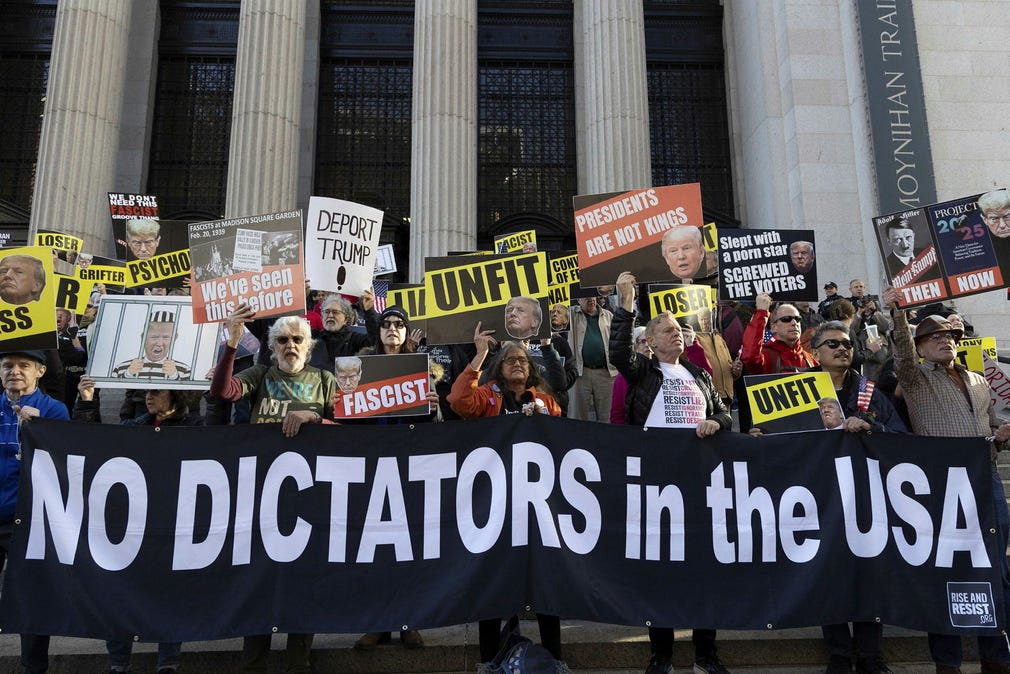
PHOENIX. It does not belong to the tradition that political opponents are accused of wanting to rule the country as a "dictator". But it takes place in the final sprint of this year's election campaign. Trump is said to admire Hitler. Does this mean that after a possible election victory he will try to turn the United States into a fascist dictatorship?
It is usually said that whoever pulls up the Hitler card against a political opponent first does not win the debate.
But what is to be said about the politician who himself takes to Hitler, and also mentions him in appreciative terms?
That is exactly what Donald Trump has done. The Atlantic magazine reported this week that Trump said in an internal conversation at the White House:
"I need the kind of generals that Hitler had... people who were totally loyal to him, who obeyed orders".
The idea had probably popped into Trump's mind after one of his generals spoke out against him during a discussion about deploying the military to quell political protests.
It would have been enough for the former president to flip through an easy-to-read handbook on World War II to learn that far from all of the Nazi leader's generals were completely loyal. In fact, it was senior German officers who organized a conspiracy that was on the verge of blowing Hitler to death in his bunker in East Prussia on July 20, 1944.
The US's former top defense chief, General Mark Milley, has stated bluntly that Trump "is a fascist at heart", an unusual statement from a leading US military.
His image is shared by Trump's former longtime chief of staff, John Kelly, who told the New York Times in an interview that his former boss said more than once that Hitler did "some good things."
"In my opinion, Trump meets the definition of a fascist, and he will rule as a dictator if he is allowed to," he told the New York Times.
Kamala Harris was not slow to use the revelations in the election campaign. To a question on CNN, she answered affirmatively to the question of whether she considers Trump to be a fascist.
She referred to the fact that Trump has said several times that the United States must defend itself against "the enemy within" and that it may be necessary to deploy the army against these "radical left-wing fools".
According to Trump, this internal enemy is also a greater threat than foreign powers such as North Korean dictator Kim Jong-Un.
One of these internal enemies is the former Democratic Speaker of the House of Representatives, Nancy Pelosi. Another is Congressman Adam Schiff, who chaired the House Intelligence Committee when Trump was first impeached.
These are the kinds of politicians Trump may take revenge on if he returns to the White House, along with other political opponents, lawyers and election officials he sees as threats to his power.
Trump must have broken the rules of democracy when he incited the storming of the US Congress. It is also hard to deny that he is authoritarian, xenophobic and plays on racism. But equating Trump with murderous despots like Mussolini and Hitler is seen by many as an exaggeration.
Which he also did himself at an election meeting on Monday:
- I am not a Nazi. I am the opposite of a Nazi.
It is uncertain to what extent the "Führer card" works as an argument to reach undecided voters. For Trump's supporters, it's just a desperate attempt to save Harris from what looks set to be an election loss.
But others believe Trump's word should be taken because he means what he says. One of them is Rachel Bitecofer, an American political scientist, who in an article in the journal The Cycle has examined what the talk of the "internal enemy" could concretely mean if Trump wins the election. Bitecofer recalls that when Adolf Hitler was sworn in as German Chancellor on January 30, 1933, he promised to uphold the constitution. It took him less than a month to dismantle the constitution and transform Germany into a National Socialist dictatorship.

Similarly, Bitecofer writes, Americans should prepare for a catastrophic change if Trump returns to power. The last time Trump moved into the White House, he appointed "generals" like Mark Milley and John Kelly, but they became brake pads for his most radical measures.
This time he does not intend to repeat the same mistake.
Trump's first step, therefore, according to what his ideological backers in Project 2025 advocate, will be to purge the civil service of professional officials and replace them with completely loyal people.
How can Trump do all this? The answer is that the Supreme Court of the United States has given Trump room to push through undemocratic measures without legal restrictions. In a controversial ruling from last summer, the president is granted immunity for decisions he makes in his official role. There is thus, fear critics of the verdict, not much to prevent Trump from deploying the military against opposition politicians or having them caged.
Listserv moderated by Toyin Falola, University of Texas at Austin
To post to this group, send an email to USAAfricaDialogue@googlegroups.com
To subscribe to this group, send an email to USAAfricaDialogue+subscribe@googlegroups.com
Current archives at http://groups.google.com/group/USAAfricaDialogue
Early archives at http://www.utexas.edu/conferences/africa/ads/index.html
---
You received this message because you are subscribed to the Google Groups "USA Africa Dialogue Series" group.
To unsubscribe from this group and stop receiving emails from it, send an email to usaafricadialogue+unsubscribe@googlegroups.com.
To view this discussion visit https://groups.google.com/d/msgid/usaafricadialogue/dd1b9a44-603b-4117-ad67-294931c8cacbn%40googlegroups.com.








No comments:
Post a Comment